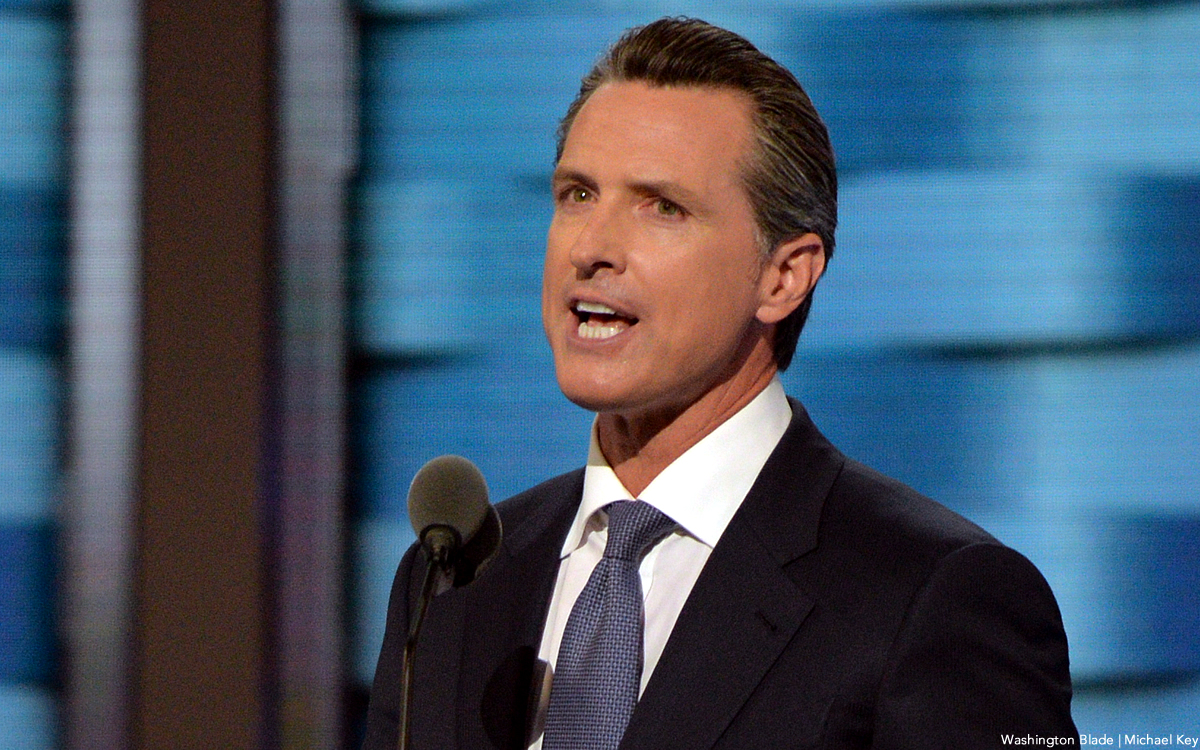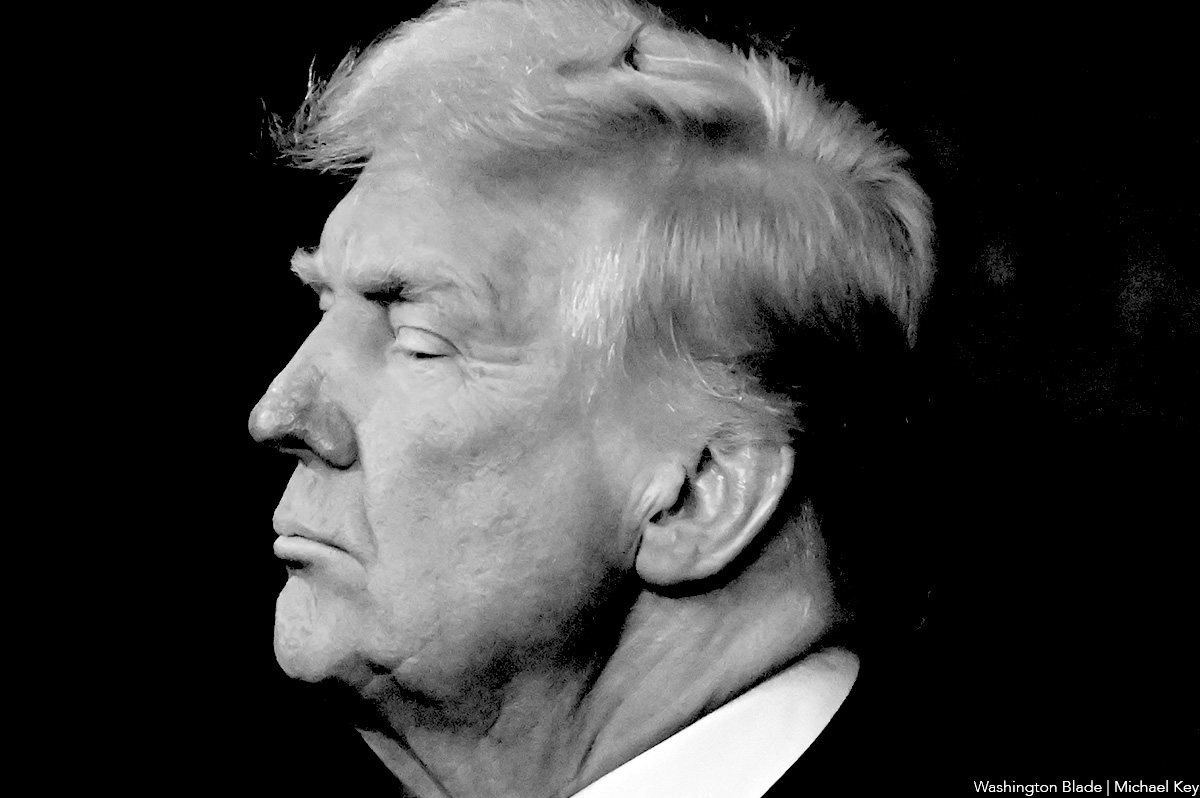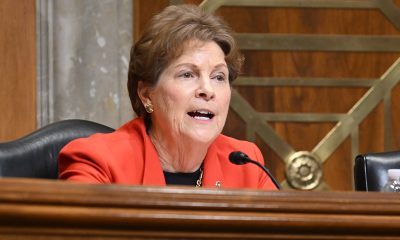Federal Government
Department of Education investigating BYU LGBTQ+ discipline policy
“They’ve wronged marginalized communities at BYU and they need to be held accountable for it” ~ former gay student at BYU

PROVO, Ut. – The U.S. Department of Education has opened an investigation into policies at Brigham Young University (BYU) that discipline LGBTQ students, aiming to determine whether or not the private religious school, owned by the Church of Jesus Christ of Latter-day Saints (LDS), is violating their civil rights.
The Education Department is investigating a complaint that came after BYU removed rules banning “homosexual activity” from its honor code in 2020, only to clarify weeks later that same-sex partnerships were still prohibited.
The probe, which opened in October of last year, will focus on Title IX, a law prohibiting universities from discriminating against students and others based on gender.
Last year, President Joe Biden signed an executive order mandating every federal agency, including the Education Department, clarify that civil rights laws protect LGBTQ people from discrimination. However, religious schools have Title IX exemptions, making federal scrutiny rare.
“It’s really significant that investigators are stepping in now,” Michael Austin, a BYU alumnus and vice president at the University of Evansville, told the Salt Lake Tribune. “It means there’s some reason to think the university has gone beyond the religious exemptions it has and is discriminating even beyond those.”
The investigation, headed by the Office of Civil Rights within the department, seems to be about whether faith-based exemptions apply even if the behavior is not directly related to education or expressly written in the honor code. BYU also bans alcohol, beards and piercings, among other things.
BYU did not respond to the Blade’s request for comment. But a spokesperson told the Associated Press that the school does not anticipate any further action because “BYU is exempt from application of Title IX rules that conflict with the religious tenets” of the LDS.
Though the LDS has softened some of its rules around LGBTQ issues, the church remains opposed to same-sex marriage and sex outside of marriage.
In a November 2021 letter to the Education Department, Kevin Worthen, president of BYU, argued that religious exemptions do apply to the school. The letter adds that all BYU students, faculty, administrators and staff “‘voluntarily commit to conduct their lives in accordance with the principles of the gospel of Jesus Christ.’”
The Department of Education responded to the letter, affirming that the university has some religious exemptions, but the department had to investigate if the complaint falls under those exemptions.
An Education Department spokesperson confirmed the investigation to the Blade but declined further comment.
Queer students at BYU celebrated the school’s removal of the anti-LGBTQ language in the honor code. Yet, the university announced weeks later that there was “some miscommunication” as to what the changes meant, clarifying that “the principles of the Honor Code remain the same.”
Bradley Talbot, a former gay student at BYU, was on campus during the apparent reversal, saying it “instilled a lot of fear and a lot of students.”
“There are still a lot of feelings of betrayal and apprehension around it,” he told the Blade.
At BYU, students who hold hands or kiss someone of the same sex can face punishment, including expulsion. LGBTQ+ students face harsher discipline than heterosexual couples at the school.
Talbot said he knew of “quite a few people” who lost their degrees and were kicked out during his time at BYU because of the gay dating ban. “People were turned in by roommates. Some people were turned in by their own parents,” he added.

The university’s clarification frustrated LGBTQ students, according to Talbot. In response, he organized a demonstration in March of 2021, lighting the “Y” that sits above BYU’s campus – one of the school’s oldest traditions – in rainbow Pride colors on the one year anniversary of the university’s letter sent to students that clarified the LGBTQ dating policy.
“We did it to reclaim that traumatic day and spin in a positive light of support, love and unity to create more visibility and awareness,” said Talbot. “And also to take a stand that we weren’t going to put up with just being tossed around by BYU. We deserve to be a part of the BYU community and a part of the LGBTQ community.”
The school has since updated its policies, banning protests and other demonstrations on Y Mountain, where Talbot staged his demonstration, in December of last year.
“Demonstrations should be consistent with BYU’s faith-based mission, intellectual environment and requirements described in the policy,” a statement added.
Still, Talbot, who is now graduated, has hope that the Education Department’s investigation will “finally change” things at BYU. “This has been something that’s been going on for decades,” he said. “They’ve wronged marginalized communities at BYU and they need to be held accountable for it.”
Federal Government
UPenn erases Lia Thomas’s records as part of settlement with White House
University agreed to ban trans women from women’s sports teams

In a settlement with the Trump-Vance administration announced on Tuesday, the University of Pennsylvania will ban transgender athletes from competing and erase swimming records set by transgender former student Lia Thomas.
The U.S. Department of Education’s Office for Civil Rights found the university in violation of Title IX, the federal rights law barring sex based discrimination in educational institutions, by “permitting males to compete in women’s intercollegiate athletics and to occupy women-only intimate facilities.”
The statement issued by University of Pennsylvania President J. Larry Jameson highlighted how the law’s interpretation was changed substantially under President Donald Trump’s second term.
“The Department of Education OCR investigated the participation of one transgender athlete on the women’s swimming team three years ago, during the 2021-2022 swim season,” he wrote. “At that time, Penn was in compliance with NCAA eligibility rules and Title IX as then interpreted.”
Jameson continued, “Penn has always followed — and continues to follow — Title IX and the applicable policy of the NCAA regarding transgender athletes. NCAA eligibility rules changed in February 2025 with Executive Orders 14168 and 14201 and Penn will continue to adhere to these new rules.”
Writing that “we acknowledge that some student-athletes were disadvantaged by these rules” in place while Thomas was allowed to compete, the university president added, “We recognize this and will apologize to those who experienced a competitive disadvantage or experienced anxiety because of the policies in effect at the time.”
“Today’s resolution agreement with UPenn is yet another example of the Trump effect in action,” Education Secretary Linda McMahon said in a statement. “Thanks to the leadership of President Trump, UPenn has agreed both to apologize for its past Title IX violations and to ensure that women’s sports are protected at the university for future generations of female athletes.”
Under former President Joe Biden, the department’s Office of Civil Rights sought to protect against anti-LGBTQ discrimination in education, bringing investigations and enforcement actions in cases where school officials might, for example, require trans students to use restrooms and facilities consistent with their birth sex or fail to respond to peer harassment over their gender identity.
Much of the legal reasoning behind the Biden-Harris administration’s positions extended from the 2020 U.S. Supreme Court case Bostock v. Clayton County, which found that sex-based discrimination includes that which is based on sexual orientation or gender identity under Title VII rules covering employment practices.
The Trump-Vance administration last week put the state of California on notice that its trans athlete policies were, or once were, in violation of Title IX, which comes amid the ongoing battle with Maine over the same issue.
Federal Government
White House finds Calif. violated Title IX by allowing trans athletes in school sports
Education Department threatens ‘imminent enforcement action’

The Trump-Vance administration announced on Wednesday that California’s Interscholastic Federation and Department of Education violated federal Title IX rules for allowing transgender girls to compete in school sports.
In a press release, the U.S. Department of Education’s Office of Civil Rights threatened “imminent enforcement action” including “referral to the U.S. Department of Justice” and the withholding of federal education funding for the state if the parties do not “agree to change these unlawful practices within 10 days.”
The agency specified that to come into compliance; California must enforce a ban excluding transgender student athletes and reclaim any titles, records, and awards they had won.
Federal investigations of the California Interscholastic Federation and the state’s Department of Education were begun in February and April, respectively. The Justice Department sued Maine in April for allowing trans athletes to compete and refusing a similar proposal to certify compliance within 10 days.
Broadly, the Trump-Vance administration’s position is that girls who are made to compete against trans opponents or alongside trans teammates are unfairly disadvantaged, robbed of opportunities like athletics scholarships, and faced with increased risk of injury — constituting actionable claims of unlawful sex discrimination under Title IX.
This marks a major departure from how the previous administration enforced the law. For example, the Department of Education issued new Title IX guidelines in April 2024 that instructed schools and educational institutions covered by the statute to not enforce categorical bans against trans athletes, instead allowing for limited restrictions on eligibility if necessary to ensure fairness or safety at the high school or college level.
Sports aside, under former President Joe Biden the department’s Office of Civil Rights sought to protect against anti-LGBTQ discrimination in education, bringing investigations and enforcement actions in cases where school officials might, for example, require trans students to use restrooms and facilities consistent with their birth sex or fail to respond to peer harassment over their gender identity.
Much of the legal reasoning behind the Biden-Harris administration’s positions extended from the 2020 U.S. Supreme Court case Bostock v. Clayton County, which found that sex-based discrimination includes that which is based on sexual orientation or gender identity under Title VII rules covering employment practices.
A number of high profile Democrats, including California Gov. Gavin Newsom, have recently questioned or challenged the party’s position on transgender athletes, as noted in a statement by Education Secretary Linda McMahon included in Wednesday’s announcement.
“Although Gov. Gavin Newsom admitted months ago it was ‘deeply unfair’ to allow men to compete in women’s sports, both the California Department of Education and the California Interscholastic Federation continued as recently as a few weeks ago to allow men to steal female athletes’ well-deserved accolades and to subject them to the indignity of unfair and unsafe competitions.”
Federal Government
Trump’s dismantling of US foreign aid derails HIV prevention effort in Africa
FDA approved breakthrough preventative drug lenacapavir earlier this month

On June 18, the Food and Drug Administration approved a long-acting injectable for the prevention of HIV that could have a transformational impact on decades-long efforts to end the epidemic in the U.S. and abroad.
Offering robust protection with just two doses per year, lenacapavir has the potential to dramatically improve uptake and adherence compared to daily oral PrEP regimens like Truvada or Descovy, particularly for high risk populations living in places with poor health infrastructure or where stigma about HIV discourages frequent testing and clinic visits.
According to the New York Times, however, the rollout of lenacapavir for HIV prevention overseas has been stymied by the gutting of agencies, staff, programs, and funding dedicated to foreign aid and public health during President Donald Trump’s second term.
Among other moves, the administration has frozen or withdrawn nearly all U.S. foreign development assistance, dismantled the U.S. Agency for International Development and reduced the size of its workforce by more than 95 percent, and shuttered key public health units housed under the U.S. Department of Health and Human Services, the National Institutes of Health, the Centers for Disease Control and Prevention, and the FDA.
As a result, the Times reports, HIV programs across the African continent have been “scrambling to procure drugs that the United States once supplied, replace lost nurses and lab technicians, and restart shuttered programs to prevent new infections.”
Experts fear HIV infection rates are climbing in some of the hardest-hit countries, but since the U.S. pulled funding for data collection and monitoring, there is no way to know for sure.
Historically, the U.S. has provided about 75 percent of all global spending on efforts to fight the epidemic, a reflection of the extent to which there was broad bipartisan support for the allocation of resources for this purpose through programs like the President’s Emergency Plan for AIDS Relief. Trump continued this legacy in his first term, launching the ambitious Ending the HIV Epidemic initiative that was continued under former President Joe Biden.
After returning to the White House, however, the president and his administration have justified their slash-and-burn cuts to the federal government’s work in international development and public health by arguing that funds and resources sent to overseas nations are too often pilfered by corrupt foreign state actors or wasted on ineffectual programs.
Trump and his allies also believe the U.S. should no longer be expected to shoulder such a disproportionate share of the responsibility for foreign aid, and that other countries are likelier to step up and contribute more in response to America’s retreat.
-

 U.S. Supreme Court4 days ago
U.S. Supreme Court4 days agoSupreme Court to consider bans on trans athletes in school sports
-

 Out & About4 days ago
Out & About4 days agoCelebrate the Fourth of July the gay way!
-

 Virginia4 days ago
Virginia4 days agoVa. court allows conversion therapy despite law banning it
-

 Opinions5 days ago
Opinions5 days agoCan we still celebrate Fourth of July this year?












